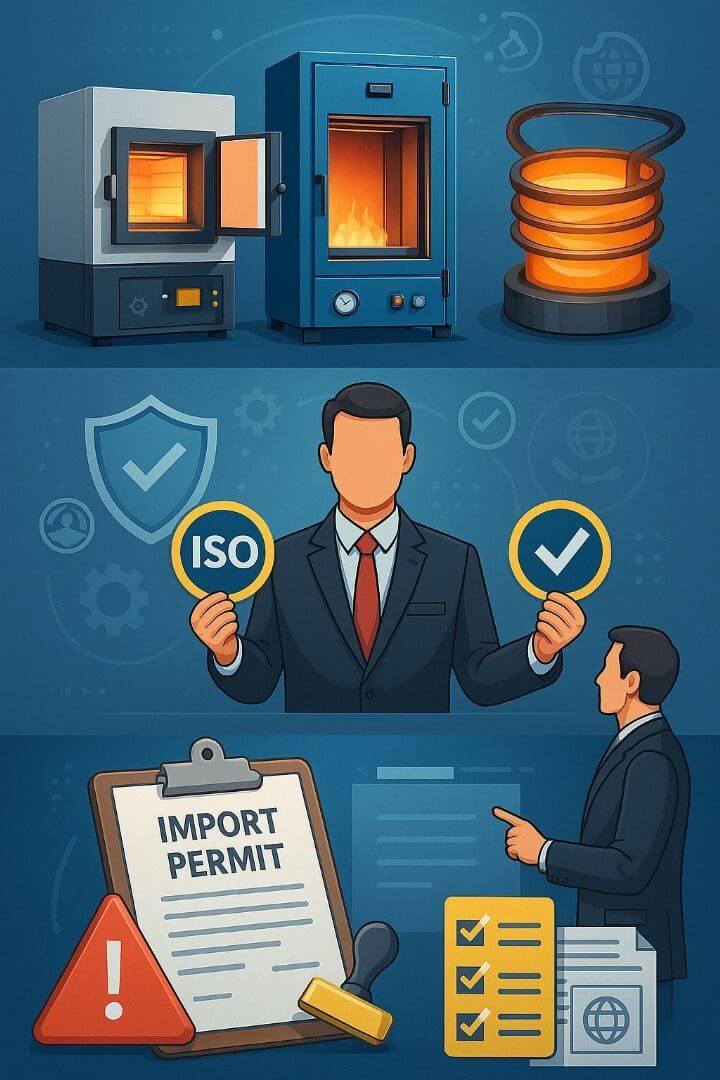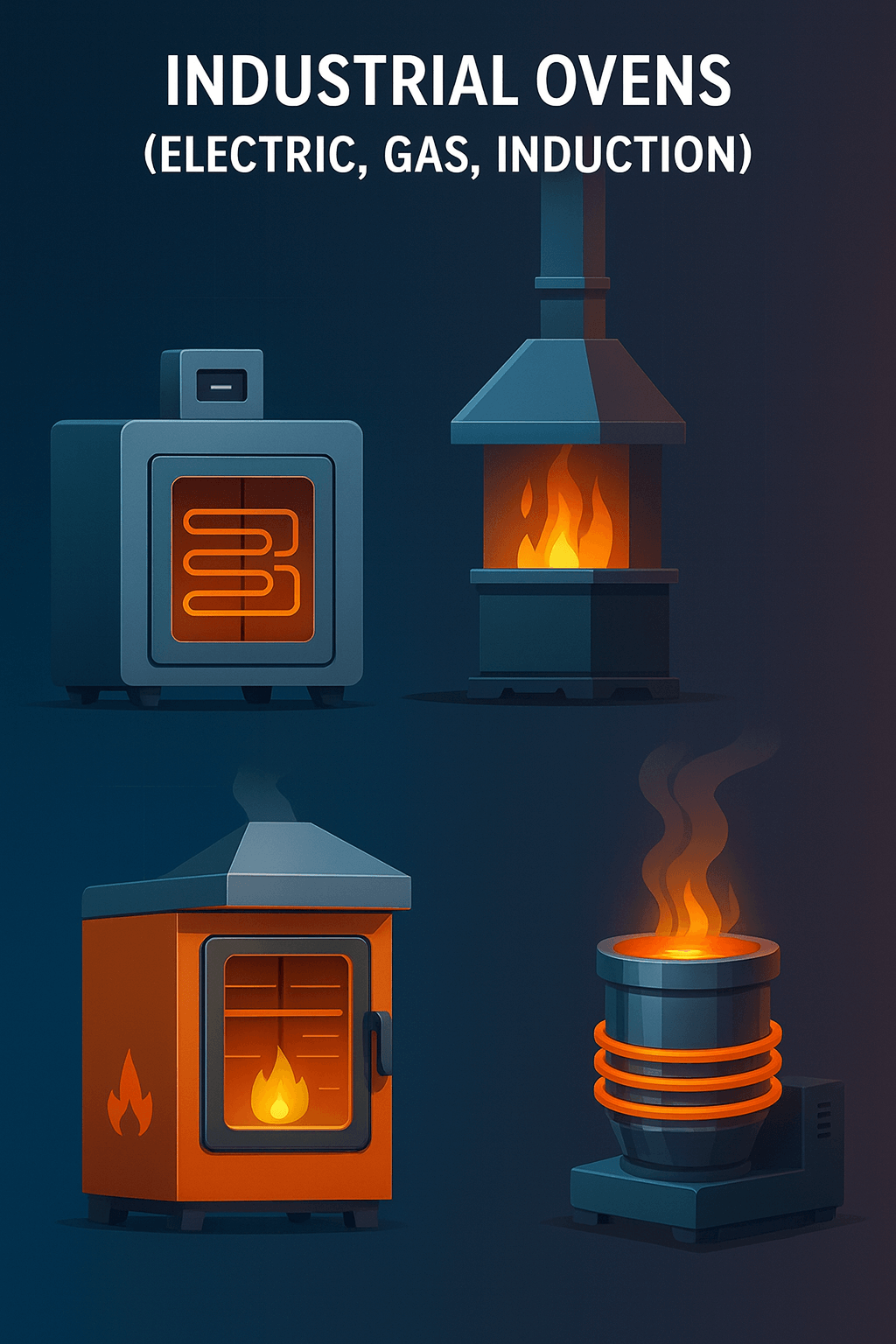Customs Clearance of Industrial & Laboratory Electric Furnaces and Ovens in Iran (HS Code + Documents & Permits)

For time and cost estimates to clear electric furnaces & ovens (industrial/lab), contact the Saba Tarkhis experts.
Instant Free Consultation1) Types of Electric Furnaces & Ovens and Their Specialized Applications
2) Importance of Standards Compliance and Customs Regulations
3) Customs Duties and Relevant HS Codes
| Item | Short Description | HS Code |
|---|---|---|
| Industrial/Laboratory Electric Furnaces & Ovens | Electric heating equipment for industry & R&D | 85141000 |
Final subheading may vary based on power/volume, heat source type, end-use, and auxiliary equipment.
4) Required Documents for Clearance
1) Commercial Invoice:
Description: Issued by the seller, including price, sales terms, item details, buyer/seller info, and other terms.
Importance: Basis for customs valuation and duty calculation. Accuracy is critical to avoid delays and extra costs.
2) Packing List:
Description: Details number of packages, net/gross weight, dimensions, and packaging type.
Importance: Helps customs reconcile package contents with other documents; used for freight calculations and tariffs.
3) Bill of Lading (B/L):
Description: Transport document issued by the carrier, indicating title, mode/terms of carriage, shipper/consignee, and cargo details.
Importance: Primary evidence of carriage and title/control of goods until final delivery.
4) Certificate of Origin (CO):
Description: Confirms the manufacturing country; issued by the chamber of commerce or equivalent.
Importance: Determines applicable tariffs and any preferential rates under trade agreements.
5) Standards & Quality Certificates (CE, ISO, etc.):
Description: Conformity documentation for specialized equipment like electric furnaces and ovens.
Importance: Proves compliance with safety, hygiene, and environmental requirements; absence may trigger strict inspections or denial of entry.
6) Special Permits from Relevant Authorities:
Description: Depending on device type/use, permits may be needed from the Iran National Standards Organization, MIMT, or—in specific cases—the Atomic Energy Organization.
Importance: Missing permits can cause delays or seizure. Coordinate and obtain permits prior to import.
Accurate, timely documentation streamlines clearance and prevents issues such as delays, extra costs, or even return-to-origin.
Need precise HS classification, permits, and document preparation? Our team manages the case end-to-end.
Request Proforma/Quotation5) Clearance Challenges and Solutions
6) Main Importers/Exporters and Target Markets
China, Germany, the USA, Japan, and South Korea are among the largest producers/exporters of electric furnaces and ovens, supplying Iran’s industrial and laboratory needs with advanced, high-quality equipment.
Importers:
Iran is a major consumer market in the region and imports a significant share of its requirements. Demand continues to rise as various industries seek advanced equipment.
Potential export destinations from Iran:
If domestically produced, nearby markets such as Iraq, Afghanistan, and Turkmenistan are prime targets due to geographic proximity and industrial demand.
7) Best Practices for Clearing Electric Furnaces & Ovens in Iran
1) Prepare/submit complete documentation (permits, transport docs, standards certificates, packing).
2) Work with a broker specialized in industrial/lab equipment.
3) Calculate and pay duties/taxes on time.
4) Observe packaging standards, electrical safety/earthing, labeling, and installation instructions.
8) Key Tips & Practical Advice
- Before order registration, reconcile HS 85141000 with the seller’s technical specs.
- For ultra-high-temperature/controlled-atmosphere units, obtain official CE/ISO certificates and the manufacturer’s safety manual.
- If magnets/strong EM equipment are present, include EMC/EMI conformity in the file.
- For faster release in Bandar Abbas/Tehran/Bazargan customs, request pre-shipment inspection and a detailed packing checklist from the maker.

Frequently Asked Questions
What is the HS Code for electric furnaces/ovens?
Per your text, these items are commonly classified under 85141000; final determination depends on technical specs, power rating, and application.
Which permits are required for import?
As applicable: approvals from the Iran National Standards Organization, MIMT, and in specific cases the Atomic Energy Organization; plus CE/ISO quality certificates and manufacturer safety documents.
What are the main clearance challenges?
Detailed technical inspections, standards compliance, complete documentation, and aligning specs with the tariff. Using a specialized broker reduces delay and cost risks.
Which documents must be included?
Commercial invoice, packing list, transport document, certificate of origin, CE/ISO certificates, and specialized permits from relevant authorities—exactly as listed in the “Documents & Records” section on this page.
Premium Customs-Clearance Services by Saba
Because of the complex, specialized nature of these devices, furnace/oven clearance requires a precise, professional approach. Choosing Saba—with the needed experience and technical knowledge—can significantly optimize timelines and reduce costs.
Specialized Tariff Consulting: Accurate HS classification based on device type and technical features—ensuring correct duty application and cost control.
Fast, Accurate Formalities: From order registration and permit acquisition to technical reviews and inspections—managed swiftly and precisely by seasoned experts.
End-to-End Follow-Up: Continuous tracking from start to finish ensures no step is overlooked and every action is done on time.
Standards Compliance: Ensuring conformity with CE, ISO, and other required permits minimizes risks of returns or penalties.
Cost-Saving Strategies: Creative solutions via optimal customs routes, special facilities, and tailored clearance plans.
Wide Office/Agent Network: With coverage at multiple Iranian customs posts, Saba provides cohesive, nationwide service for all industrial machinery.
.png)
